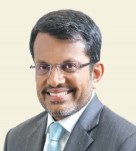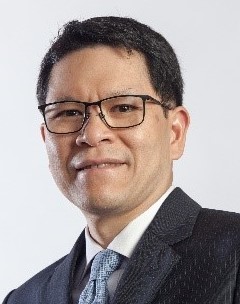
![]() JOIN THE CONVERSATION: #PERJACOBSSON, #MONETARYPOLICY
JOIN THE CONVERSATION: #PERJACOBSSON, #MONETARYPOLICY
The Per Jacobsson Lecture will bring together central bank governors from countries in Southeast Asia to discuss key issues and challenges facing central banks, including whether there is a new orthodoxy for monetary policy.
Opening Remarks
Opening Remarks: David Lipton, Deputy Managing Director, IMF
Moderator: Ravi Menon, Managing Director, Singapore Monetary Authority
Speakers:
Veerathai Santiprabhob, Governor, Bank of Thailand
Nor Shamsiah binti Mohd Yunus, Governor, Bank Negara Malaysia
Perry Warjiyo, Governor, Bank of Indonesia
Capital flows between advanced and emerging economies have doubled over the last few decades due to a confluence of factors. Panelists discussed the impact of these developments and factors on emerging markets and what this means for monetary policy. Speakers agreed that a combination of policy responses is needed to tackle large capital flows, including exchange rate adjustment, reserve management and macroprudential measures (MPMs).
Key Points:
• Exposure and policy responses. Speakers agreed that the impact of volatile capital flows on the domestic price level is critical.Yunus noted that the exposure and impact from capital flows depends on the depth and liquidity of domestic financial markets and that having a deep pool of institutional investors can help counteract the impact on prices.
• Macroprudential tools and CFMs. Yunus, Santiprabhob underscored the usefulness of macroprudential tools to address sector specific imbalances. Warjiyo highlighted the case for CFMs and MPMs to address cyclical fluctuations. Santiprabhobunderscored that these measures cannot substitute for prudent monetary policy. Speakers agreed that measures should be complementary to traditional monetary policy.
• Central bank mandate. Warjiyo said that there should be a joint mandate among domestic financial institutions to promoting financial stability, in addition to inflation targeting. Santiprabhob noted that there is scope for financial stability to become a more prominent part of monetary policy objectives and urged continued research in this area. Yunus was of the view that central banks should calibrate monetary policy holistically, rather than focusing on price stability, with the aim of achieving sustainable growth.
• Country-specific assessments. Speakers underscored the importance of understanding country-specific factors. Yunushighlighted the need to understand the decomposition of short-term external debt and whether is it held centrally or with commercial banks, and determining the adequate level of reserves based on a holistic view of the economy. She underscored that, in Malaysia, having large reserve buffers was critical in managing large capital reversals in 2013.
Quotes:
“There are episodes of capital flow reversals that have nothing to do with fundamentals, and then we need to smooth the path - this is not targeting the exchange rate, but anchoring it” – Perry Warjiyo
“For capital account transactions the exchange rate can be a shock amplifier” – Veerathai Santiprabhob
“[FX intervention] is an art, not a science” – Nor Shamsiah binti Mohd Yunus
“It is important to understand where reserves are held for the economy as a whole, not just [those held at] the central bank” – Nor Shamsiah binti Mohd Yunus
“We should be able to use capital flows measures preemptively to minimize the overshooting effect from inflows” – Nor Shamsiah binti Mohd Yunus
Contributor: Marushia Gislén
 |
| David Lipton |
| First Deputy Managing Director, IMF |
Mr. David Lipton assumed the position of First Deputy Managing Director of the International Monetary Fund on September 1, 2011. On March 28, 2016, Mr. Lipton was reappointed for a second five-year term beginning September 1, 2016.
Before coming to the Fund, Mr. Lipton was Special Assistant to the President, and served as Senior Director for International Economic Affairs at the National Economic Council and National Security Council at the White House.
Previously, Lipton was a Managing Director at Citi, where he was Head of Global Country Risk Management. In that capacity, he chaired Citi’s Country Risk Committee, worked for the Senior Risk Officer, and advised senior management on global risk issues.
 |
| Ravi Menon |
| Managing Director, Monetary Authority of Singapore |
Ravi Menon was appointed Managing Director of the Monetary Authority of Singapore (MAS) in 2011. He was previously Permanent Secretary at the Ministry of Trade & Industry (MTI) and Deputy Secretary at the Ministry of Finance (MOF). Mr. Menon began his career at MAS in 1987. During his 16 years in MAS, he was involved in monetary policy; econometric forecasting; organizational development; banking regulation and liberalization; and integrated supervision of complex financial institutions. Mr. Menon spent a year at the Bank for International Settlements in Basel, as a member of the secretariat to the Financial Stability Forum. A recipient of the Singapore Government's Meritorious Service Medal and Public Administration (Gold) Medal, Mr. Menon has served on a variety of boards in the public, private, and people sectors in Singapore. On the international front, Mr. Menon is a member of the Financial Stability Board (FSB) Steering Committee. Mr. Menon holds a Master's in Public Administration from Harvard University and a Bachelor of Social Science (Honours) in Economics from the National University of Singapore.
 |
| Veerathai Santiprabhob |
| Governor, Bank of Thailand |
Veerathai Santiprabhob has been the Governor of the Bank of Thailand since October 2015. He also currently serves as a member of the Securities and Exchange Commission Committee, the National Economic and Social Development Board and the State-Owned Enterprise Policy and Supervisory Committee. Since 2017, he has served as the Chair of the Central Bank Governance Group and the Asian Consultative Council of the Bank for International Settlements (BIS). Veerathai is a macroeconomist, strategist, and a financial professional with more than 20 years of experiences in economic policy design, commercial banking, and capital markets. He began his career as an economist at the IMF before serving as a co-director of Policy Research Institute of Thai Ministry of Finance during the 1997 Asian financial crisis. He had spent most of his career in the private sector serving as a senior executive of Siam Commercial Bank, PCL and The Stock Exchange of Thailand. He had also served as an advisor of Thailand Development Research Institute and a board member of various leading corporations. Veerathai received his B.A. (first class honors) in Economics from Thammasat University in 1988 and A.M. and Ph.D. in Economics from Harvard University in 1994, sponsored by H.M. the King Bhumibol Adulyadej’s Anandamahidol Foundation. He was awarded the Eisenhower Fellowship in 2013.
 |
| Nor Shamsiah binti Mohd Yunus |
| Governor, Bank Negara Malaysia |
Datuk Nor Shamsiah binti Mohd Yunus is the 9th Governor of Bank Negara Malaysia. Appointed in July 2018, she was the Deputy Governor of Bank Negara Malaysia from 2010 until 2016. Datuk Nor Shamsiah was the Deputy Governor of Bank Negara Malaysia from 2010 until 2016. She recently served as Assistant Director of the Monetary and Capital Markets Division of the International Monetary Fund.
As Deputy Governor, Datuk Nor Shamsiah was responsible for banking, insurance and Takaful supervision, financial intelligence and enforcement, talent management, finance and shared services of the central bank. Datuk Nor Shamsiah joined Bank Negara Malaysia in 1987 and has served in various areas including prudential regulations, legislation, policies and guidelines for the financial sector and supervision. She was involved in the financial sector resolution initiatives during the Asian financial crisis. She played a key role in the formulation and implementation of the Financial Sector Masterplan (2001-2010) and Financial Sector Blueprint (2011-2020) that charts the development of the Malaysian financial system.
Datuk Nor Shamsiah graduated from the University of South Australia with a Bachelor of Arts Degree in Accountancy and is a Certified Practising Accountant (CPA).
 |
| Perry Warjiyo |
| Governor, Bank Indonesia |
|